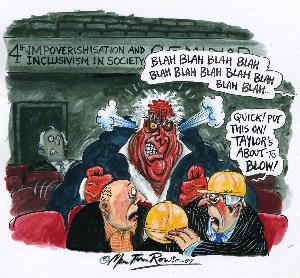 I’ve steered well clear of conferences ever since my appalling behaviour at the British Social Psychological Society’s get-together back in 1999. Half-way through a plenary session on social interaction I stood up and suggested loudly that most of the speakers had a damned nerve talking about the inadequacies of other people’s personal skills when they themselves were so evidently incapable of using plain language and speaking in a voice that could carry beyond the third row.
I’ve steered well clear of conferences ever since my appalling behaviour at the British Social Psychological Society’s get-together back in 1999. Half-way through a plenary session on social interaction I stood up and suggested loudly that most of the speakers had a damned nerve talking about the inadequacies of other people’s personal skills when they themselves were so evidently incapable of using plain language and speaking in a voice that could carry beyond the third row.
There was no real intellectual justification for my outburst. The platform party was no worse than any other public assembly of academics. One hears about people who can’t sit through classical music concerts or long church services. It’s not just boredom or a brief attention span. They’re psychologically unable to do it because of their inner knowledge that when faced by such a prolonged demand for respectful silence they are likely to be overcome by a terrible desire to shout abuse or scream obscenities.
I’m like that with conferences. No sooner has the invited speaker begun to describe the parameters of their research to an audience of rapt academic colleagues than I’m preparing some fundamental objection to everything that is being said. Not a rational or analytical objection. No, what I’m building up to, what I know I’ll be unable to resist, is an emotional outburst.
But even that knowledge was not quite enough to stop me accepting a recent invitation to attend the Social Innovation Summit at the Grove Hotel in Hertfordshire. It was, the invitation informed me, to be not just a conference but a dialogue hosted by KPMG International and Macquarie Bank which sought “to bring together leaders from business, government and the community sector to discuss urgent social issues”. It is hoped, continued the blurb, that over the two days, “leaders such as yourself, Lord MacDonald, Geoff Mulgan, Will Hutton and many others will deliver long term solutions to some of our most pressing social problems.”
It all started rather well. The Grove Hotel turned out to have grounds extensive enough to solve the entire British housing crisis and was also simultaneously accommodating the full English football team. This ensured that even the dullest seminar session, the sort that might normally provoke one of my outbursts, was greatly enlivened by the sight of John Terry or Steven Gerrard strolling across the terrace. Indeed, by the end of the two days a considerable proportion of the delegates seemed more concerned with spotting footballers than addressing themselves to the problems of disaffected youth or urban blight. (One delegate nicely captured the nature of this distraction at the last plenary session by remarking that he’d just run into Michael Owen, who’d asked him if it was really true that Will Hutton was staying in the same hotel!)
Even though the proceedings weren’t particularly fruitful I managed to contain myself until after the lavish conference dinner. As we sat sipping coffee, we were treated to a talk by a leading member of a charity devoted to providing aid to the disadvantaged youth of our inner cities, as well as a short speech by guest of honour Iain Duncan Smith, who described his own commendable visits to such socially and culturally impoverished areas. It was at this point that I felt the devil rising within me. So much reverential consensus. So much acquiescent silence. Before I knew it I was on my feet denouncing the entire proceedings as a patronising charade in which the assembled delegates had deliberately forgotten the awkward details of their own lives – their lack of community, their readiness to take recreational drugs, their propensity to send their children to private schools – in order that they could pathologise the lives of the working class.
In less polite surroundings I might have achieved my barely unconscious wish to be forcibly ejected but it was somewhat gratifying to find that the only people who spoke to me in the bar after my outburst were a motley collection of conference deviants: an almost silent man with a severe cough who smoked full-strength Marlboros and a woman who’d been recently sacked from her charitable post for what sounded like serious malpractice.
I couldn’t resist prodding the silent Marlboro man for his reaction to my outburst. Did he have any sympathy with my views? He puffed quietly for a moment. “Not really,” he said finally. “But then if you ask me that lot wouldn’t know social innovation if she came into the room, took all her clothes off and pole-danced for half an hour.” But why hadn’t he considered saying something to that effect? “Don’t like making a fucking fool of myself,” he said, reaching once more for his lighter.

